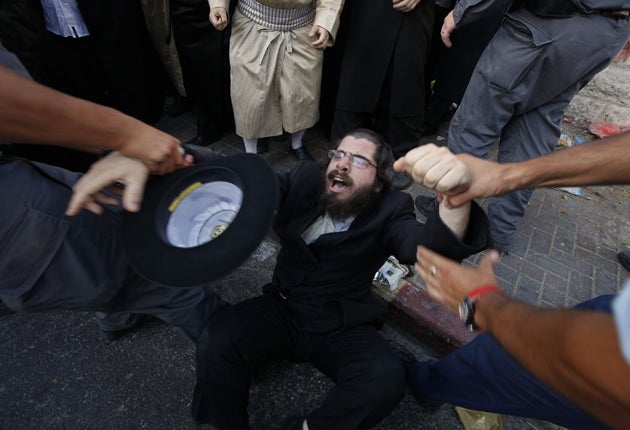The city where parking leads to a head-on collision in Jerusalem
Secular Mayor's decision angers ultra-orthodox Jews

Your support helps us to tell the story
From reproductive rights to climate change to Big Tech, The Independent is on the ground when the story is developing. Whether it's investigating the financials of Elon Musk's pro-Trump PAC or producing our latest documentary, 'The A Word', which shines a light on the American women fighting for reproductive rights, we know how important it is to parse out the facts from the messaging.
At such a critical moment in US history, we need reporters on the ground. Your donation allows us to keep sending journalists to speak to both sides of the story.
The Independent is trusted by Americans across the entire political spectrum. And unlike many other quality news outlets, we choose not to lock Americans out of our reporting and analysis with paywalls. We believe quality journalism should be available to everyone, paid for by those who can afford it.
Your support makes all the difference.In most cities, parking facilities do not trigger violence. But in Jerusalem, police were gearing up yesterday for possible new clashes in the war between religious and secular Jews over parking on the Jewish sabbath. Hardline rabbis ordered a protest last month in which thousands of ultra-orthodox men tried to storm a municipality-owned garage, adjacent to City Hall, after it opened for the first time on the sabbath at the orders of the city's new secular Mayor, Nir Barkat.
In scenes reminiscent of the first Palestinian uprising, Jewish demonstrators hurled rocks and bottles and screamed "Nazis" at police before they were pushed back to the nearby ultra-orthodox suburb of Mea Shearim.
Yesterday, ultra-orthodox leaders declined to call off prayer protests planned for this evening despite Mr Barkat's move to lessen the perceived offence by opening a substitute site further from their homes.
The clash over the sabbath reflects a longstanding battle between secular and religious Jews over what it means for Israel to be a Jewish state. But it also revolves around power-plays between hardliners and moderates among the ultra-orthodox.
Matters are coming to a head because of Mr Barkat's efforts to jump start the economy of the city, where a religious minority has traditionally wielded clout. Boosting tourism is key to his economic agenda and to achieve that, he needs to open a garage on the sabbath near the Palestinian Old City.
Ultra-orthodox hardliners believe even one garage can spoil the sanctity of the sabbath, a day on which it is prohibited to drive or engage in any work. "We are talking about the character of Jerusalem," said Shmuel Feffenheim, from the Eda Haredit group that has led the protests. "We do not accept that everyone be concerned just with his own territory. The city has a sanctity."
Their opponents stress the issue is not just parking but personal freedom. "I don't force them into a car on Saturdays and they have no right to dictate to us how we live," says the Meretz party city councillor Laura Wharton.
Secular leaders said they would proceed with a demonstration today to strengthen Mr Barkat's resolve against "religious coercion". Ms Wharton said: "I think we are finally beginning to see the results of having a Mayor with a secular world view. I hope this is the beginning of a turnaround."
Join our commenting forum
Join thought-provoking conversations, follow other Independent readers and see their replies
Comments